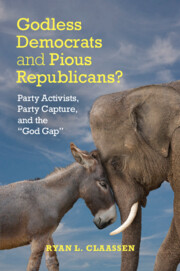Book contents
- Frontmatter
- Dedication
- Contents
- Figures
- Tables
- Acknowledgments
- Introduction
- 1 The Religious Divide in American Politics
- 2 Mobilization, Capture, and Misunderstood Trends
- 3 Representation and Four Forces that Shape Change Among Activists
- 4 First Force, The Effect of Being Fruitful and Multiplying
- 5 Second Force, The Effect of Voting Early and Often
- 6 Third Force, The Effect of Picking a Side
- 7 Fourth Force, The Effect of Writing Checks and Knocking on Doors
- 8 “Capture” Revisited, Representation, and Religious Activists
- 9 Conclusion
- Appendix A Coding for the Major Religious Traditions
- Appendix B Frequencies for Change Factor Computations
- Appendix C The Raw Materials for Assessing the Role of Demographic Change in the Activist Pools
- Appendix D Voter Loyalty Trend Estimates with Additional Control Variables
- Appendix E Republican Voter Loyalty Among Evangelicals and Region Versus Religion
- Bibliography
- Index
Introduction
Published online by Cambridge University Press: 05 June 2015
- Frontmatter
- Dedication
- Contents
- Figures
- Tables
- Acknowledgments
- Introduction
- 1 The Religious Divide in American Politics
- 2 Mobilization, Capture, and Misunderstood Trends
- 3 Representation and Four Forces that Shape Change Among Activists
- 4 First Force, The Effect of Being Fruitful and Multiplying
- 5 Second Force, The Effect of Voting Early and Often
- 6 Third Force, The Effect of Picking a Side
- 7 Fourth Force, The Effect of Writing Checks and Knocking on Doors
- 8 “Capture” Revisited, Representation, and Religious Activists
- 9 Conclusion
- Appendix A Coding for the Major Religious Traditions
- Appendix B Frequencies for Change Factor Computations
- Appendix C The Raw Materials for Assessing the Role of Demographic Change in the Activist Pools
- Appendix D Voter Loyalty Trend Estimates with Additional Control Variables
- Appendix E Republican Voter Loyalty Among Evangelicals and Region Versus Religion
- Bibliography
- Index
Summary
President Obama used his health care plan to declare war on religion.
– Televised Campaign Advertisement for Mitt Romney, Republican presidential candidate, 8/9/2012I understand that there's a war against religion and I am prepared to actually fight back.
– Newt Gingrich, Candidate in the Republican presidential primary, Time, 1/30/2012As president, I'll end Obama's war on religion.
– Rick Perry, Candidate in the Republican presidential primary, Televised Campaign Advertisement, 12/6/2011The most offensive instance of this war on religion has been the current Administration's attempt to compel faith-related institutions, as well as believing individuals, to contravene their deeply held religious, moral, or ethical beliefs regarding health services, traditional marriage, or abortion.
– Republican Platform, 2012The media routinely frame policy debates as battles between Secular Democrats and religious Republicans. Religion and politics scholars describe growing partisan divisions between religious and nonreligious people as a “God gap” in American politics. And political campaigns indulge in bellicose rhetoric, even alleging that one party has declared a “war on religion.” Combined, these forces fuel a false conventional wisdom that has the Democratic Party captured by Secular activists (e.g., campaign donors and volunteers) and the Republican Party captured by Evangelical activists. Never mind that many Democrats believe in God, attend religious services, formally belong to places of worship, tithe, and pray. Never mind that many Republicans do not. Obvious religious diversity among Democrats and Republicans fails to undermine the “capture” narrative precisely because “capture” implies that those wielding influence in partisan politics do not represent rank-and-file partisans. Political activism is relatively rare and so, in theory, Evangelical and Secular activists could out mobilize other groups and wield influence out of proportion with their numbers. Is the “war on religion” plank in the Republican platform emblematic of outsized influence of Evangelical activists? Have Secular activists “captured” the Democratic Party and declared “war on religion?” These are important questions and this book undertakes a careful investigation of the changing religious composition of partisan activists in order to assess how religious and nonreligious groups are represented in party politics.
- Type
- Chapter
- Information
- Godless Democrats and Pious Republicans?Party Activists, Party Capture, and the 'God Gap', pp. 1 - 10Publisher: Cambridge University PressPrint publication year: 2015

